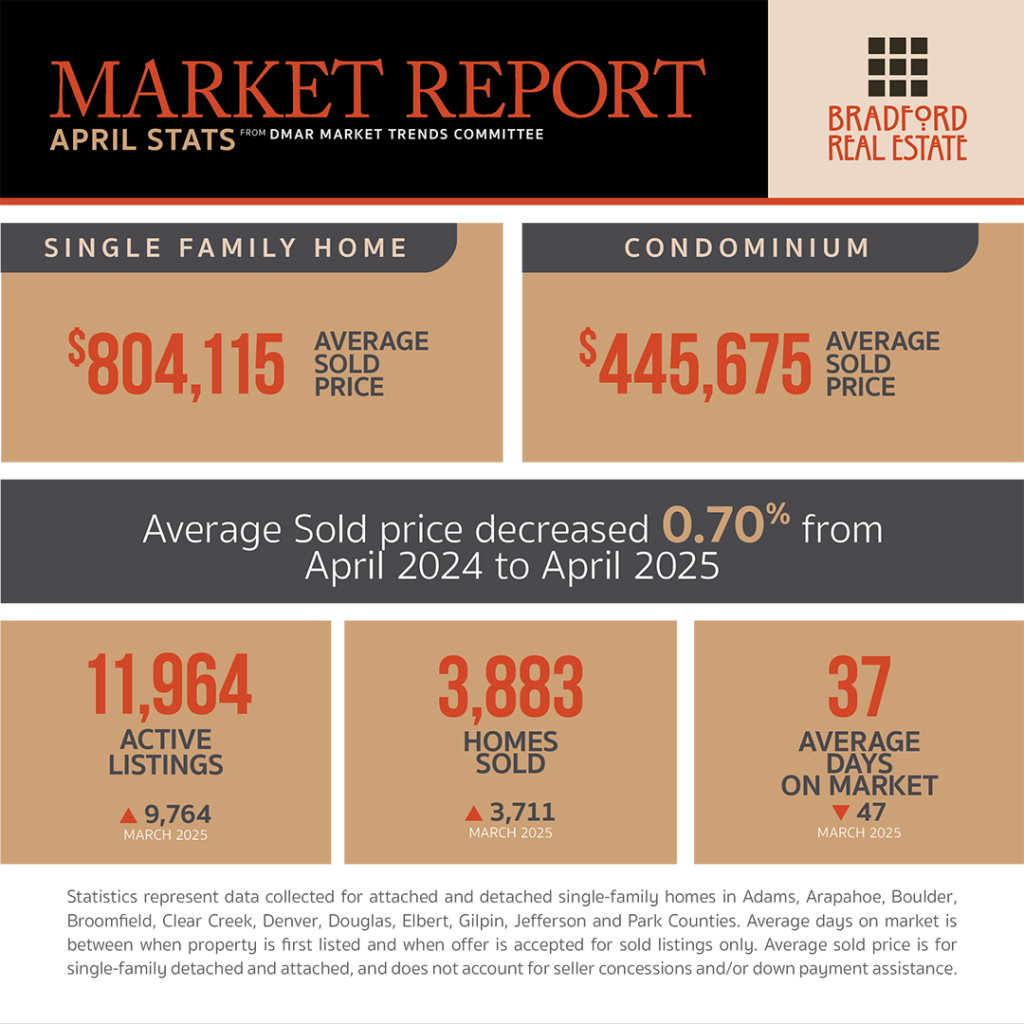home
about
properties
contact
blog
Market Insights
May 20, 2025
As published in DMAR Market Trends, April 2025
For investment properties, timing is key. Investors purchasing a fix-and-flip should factor seasonal market patterns into their projections for after-renovation value, as timing can influence buyer demand and pricing.
Post-Closing Occupancy Agreements are back. Whether a client is asking for or offering one, brokers on both sides of the deal should be up-to-date on Colorado’s security deposit rules, be prepared to help clients develop clear possession expectations and ensure client contact information is exchanged at closing.
According to real estate and design professionals, kitchen upgrades that deliver the worst return on investment include high-end and specific-feature appliances and overly trendy designs. Better bets include eat-in kitchens, updated counters, cabinetry, hardware, lighting and refreshed backsplashes.
The number of price reductions and days on market continue to rise but for some of the truly special homes, or homes that buyers see as incredible value, they are flying off the market with multiple offers. This has kept many Denver area Realtors® on their toes, as some traditionally “perfect” homes are gathering dust while others are finding the right buyer quickly.
Property tax assessments have arrived, however, the sharp increases seen two years ago have slowed, with assessments generally either rising slightly or declining. This is a welcome relief as property tax assessments have increased for fourteen straight years.
Denver ranked fifth on the list of cities with the highest percentage of seller concessions in the first quarter of 2025, with 59.2% of home sales featuring a concession.
After nearly three years of extensions, Denver will now only approve most residential development projects in the city if they include affordable housing.
Denver’s Populus Hotel earned top recognition as one of the best new hotels in the world by Travel+ Leisure. In the list, Populus is celebrated as the world’s first carbon-positive hotel.
Betway’s “Coolest Cities in North America” report, published in March 2025, analyzed 50 of the most populous cities across the U.S. and Canada to determine which urban centers stood out for their cultural vibrancy and lifestyle appeal. Denver ranked sixth overall in the U.S., highlighting its youthful median age of 34.6 and a dynamic cultural scene.
A significant increase in rental supply has led to a decline in apartment rents. In 2024, the Denver Metro area added approximately 20,000 new apartment units, a 5% increase in inventory. This surge in supply has led to a rise in vacancy rates to approximately seven percent, the highest in 15 years.
Trailbreak Partners, a Denver commercial real estate investment and development firm, broke ground Tuesday morning for Kaia Residences, a new 295-unit apartment complex. The 18-story, $160 million development in the Capitol Hill neighborhood will offer a mix of studio, one-, two- and three-bedroom apartments, with 19 designated as affordable.
The City of Englewood is moving forward with a proposed infrastructure project known as the Rail Trail, which is intended to improve connectivity, safety and transportation options throughout the community.
Wheat Ridge approved the rezoning of the 100-acre former Lutheran Medical Center property for new housing, retail and open space.
Denver is overhauling its construction permitting system to reduce the time it takes to process applications, partly to expedite the development of 44,000 affordable housing units over the next decade.
Mayor Mike Johnston has proposed an $800 million bond initiative aimed at revitalizing Denver’s public spaces, including parks, trails and cultural venues.
National inventory, as seen here in Denver, is on the rise and expected to return to pre-pandemic levels by the second half of 2025, turning some seller’s markets into balanced markets, and more balanced markets into buyer’s markets.
In March 2025, unemployment rates were higher than the previous year in 279 out of 387 metropolitan areas, including the Denver-Aurora-Lakewood MSA, while 72 areas saw declines and 36 remained unchanged.
Zillow announced a new policy that bans home listings from appearing on its platform if they were first listed for sale in private networks more than 24 hours before appearing on the MLS.
A Harvard briefing highlights the impact of climate change on housing costs, emphasizing the economic consequences of decades of reactive disaster policies rather than preventive measures. The financial burden will increasingly fall on insurers and policyholders.
On average, building suppliers increased prices by 6.3% in response to announced, enacted, or expected tariffs. In turn, 60% of builders now forecast a cost increase of $10,900 per unit on new construction homes.
MORTGAGE NEWS
Demand as measured by mortgage application data, particularly for home purchases, continues to be subdued by broader economic uncertainty and signs of labor market weakness, dropping to the slowest pace since February. Conventional and VA applications dropped six percent and four percent, respectively.
First Quarter 2025 Advance Estimate GDP decreased at an annual rate of 0.3%, dropping from an increase of 2.4% in the fourth quarter 2024. While much of this almost 3% drop is being shrugged off due to an increase in pre-tariff imports and is expected to bounce up slightly in the second quarter. expectations are for lower GDP and indications of a recession in the third and fourth quarters of 2025.

Be the first to comment